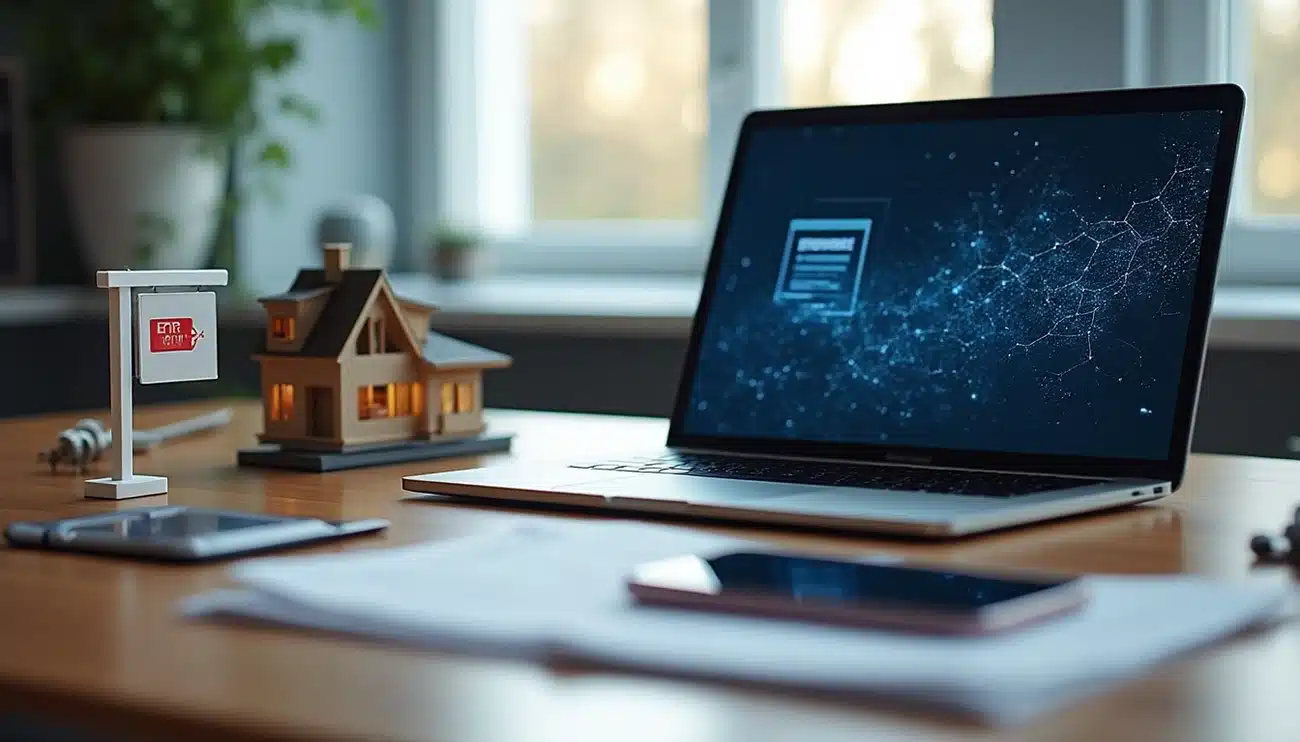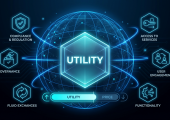This perfectly illustrates the paradox of today's crypto real estate. On the one hand, blockchain and real estate seem to form an ideal marriage, offering transparency and traceability in a sector where "authenticity is essential" . On the other, certain realities often remain in the shadows. As early as 2018, experts were highlighting the potential of blockchain in real estate, but today we can see that practical applications, while promising, are still limited.
In this article, we'll explore together the truth about blockchain real estate in 2025. We will examine the real benefits of this technology, which "brings decentralisation, transparency and contractual automation", but also the aspects less discussed by the experts. Our aim is to give you a complete picture so that you can navigate this new investment landscape with a clear head.
Blockchain in real estate: a revolution in the making
Image Source: BlockchainX
In 2025, blockchain real estate will profoundly transform the traditional property sector. This technology is no longer limited to a few experimental projects, but is establishing itself as a credible alternative to traditional investments.
Understanding the tokenisation of goods
Tokenisation is the process by which a property is converted into digital tokens on a blockchain. In concrete terms, a property worth 1 million euros can be divided into 10,000 tokens of €100 each. This fractionalization allows investors with modest budgets to access a market that was previously reserved for the very wealthy.
Each token represents a precise fraction of the property and entitles the holder to a proportional share of the revenue generated. All transactions are recorded immutably on the blockchain, guaranteeing total transparency for all participants.
The difference between physical property and tokenised property
Traditional physical real estate generally involves complex administrative procedures, multiple intermediaries and high costs. In contrast, tokenised real estate offers a number of distinct advantages:
- Accessibility: Investment possible for as little as a few dozen euros
- Increased liquidityTokens can be exchanged 24 hours a day, 7 days a week.
- Smart contractsSmart contracts automate the distribution of rental income
- Traceability: Full ownership history available at all times
However, investors in tokenised property do not have physical use of the property and are dependent on the platform for day-to-day management.
Why blockchain is attracting investors
Blockchain is particularly attractive to investors for a number of reasons. Firstly, it eliminates many traditional intermediaries (notaries, estate agents), thereby reducing transaction costs. Secondly, it allows geographic diversification of the property portfolio without the usual constraints associated with international investments.
Technology also brings unprecedented transparency. Investors can check the authenticity of documents, the history of transactions and the actual performance of the property. This traceability is a powerful argument in a sector that is sometimes opaque.
Crypto real estate is also attractive for its promise of automation. Rent payments, income distribution and even certain management decisions can be programmed via smart contracts, greatly simplifying the investment experience.
Platforms and tools for investing in 2025
Image Source: SoluLab
Tokenised real estate platforms are multiplying in 2025, offering various options for investors wishing to explore this new market.
RealT: a pioneer in tokenised property
Founded in 2019, RealT dominates the tokenized real estate market by enabling investment in U.S. real estate from just 50 dollars [1]. The platform splits each property into thousands of digital tokens (RealTokens) on Ethereum and Gnosis Chain [1]. Investors receive weekly rental income, with annual yields ranging from 7% to 20%. [1]. RealT outsources property management to local professionals, thereby eliminating the traditional constraints associated with renting. [1]. For those unfamiliar with cryptocurrencies, the "Walletless" feature makes it easy to access the platform. [2].
Wincity, BlocHome, Atoa: European alternatives
In France, several platforms are now competing with RealT. Wincity offers a unique model combining NFT and real estate [3]. This platform issues 1111 cards for each property, divided according to their rarity (1000 regular, 100 rare, 10 mythic, 1 unique). [4]. Rare card holders benefit from advantages such as priority access to new projects. [3].
BlocHome, set up in 2021 in Luxembourg, allows you to invest as little as €50 per month via a DCA (Dollar Cost Averaging) system, with an initial deposit of €1,000. [3].
Atoa, a French platform, also authorises investments from €50. [5]. Its model secures investments by means of a security trust guaranteeing the capital invested. [5]. However, its higher costs (10% on transactions and rents) [3].
NFT real estate: a new form of ownership
Real estate NFTs represent a significant development in property rights. Each token is equivalent to a specific fraction of a real asset, offering proportional rights and income. [4]. This approach considerably increases the liquidity of the traditional property market. [1].
How to buy shares via crypto real estate
To get started, identity verification (KYC) is generally required [1]. The platforms accept various means of payment: cryptocurrencies (BTC, ETH, USDC, etc.) or credit cards. [6]. After the purchase, a digital contract is sent to you for signature, making your ownership official. [1].
Looking to learn more about asset tokenisation? Visit our platform https://token.deravel.com which is proposing an innovative project linked to the tokenisation of financial and property assets.
What the experts don't always say
Image Source: Cloaked
Behind the attractive promises of blockchain real estate lie less publicised realities that investors should be aware of before taking the plunge.
Non-guaranteed yields and rental vacancies
Contrary to the marketing rhetoric, no serious company can guarantee a minimum return in the world of crypto-assets [7]. Income depends entirely on your ability to let the property and the actual payment of rent. A period of vacancy or non-payment of rent will have a direct impact on your income. [8]. What's more, like any traditional property investment, tokenised property is subject to fluctuations in the property market, with a real risk of capital loss. [9].
Low liquidity of tokens on the secondary market
Despite promises of increased liquidity, the reality is often different. How easy it is to resell your tokens depends entirely on the popularity and activity of the secondary market, which is extremely variable [10]. As a result, some investors find themselves with assets that are difficult to sell quickly without taking a substantial discount.
Risks associated with the bankruptcy of platforms
In the event of the bankruptcy of a platform, even one authorised by the AMF, crypto-assets are not covered by the Fonds de garantie des dépôts et de résolution (FGDR) guarantee scheme. [7]. Recent examples speak for themselves: Genesis, unable to repay $3.4 billion in debt [11]or FTX, whose collapse revealed a Ponzi scheme [11]. Without protection equivalent to bank deposits, your capital can simply disappear.
Tax complexity in France
The tax system applicable to tokenised property investments is particularly opaque. For occasional investors, a single flat-rate tax of 30% applies (12.8% income tax and 17.2% social security contributions) [9]. For regular investors, capital gains are subject to the progressive scale for industrial and commercial profits. [9]. This complexity often requires the intervention of a tax expert, generating additional costs. [8].
Lack of clear regulation
The regulatory environment is still young and constantly evolving [8]. The legal classification of real estate tokens varies from country to country [12]. Some consider them as financial securities, others as real estate, with very different tax consequences. [12]. This uncertainty creates legal uncertainty that can expose investors to unforeseen regulatory risks.
How to get started safely
Image Source: Debut Infotech
Getting started in blockchain real estate requires a methodical approach to minimise the risks. Here are the essentials for getting started with peace of mind.
Choosing a reliable platform
To ensure the security of your investments, opt for established, regulated platforms. RealT stands out as a particularly recommended option for beginners, allowing you to invest from 50 dollars [13]. The legal structure is also crucial: creating an independent company for each asset (LLC model) effectively protects investors in the event of default by the parent company. [14].
Diversifying your tokenised investments
By dividing property values into tokens, you can easily diversify your portfolio by acquiring several tokens for different properties. [9]. Before investing, set yourself SMART (specific, measurable, achievable, realistic and time-bound) objectives and analyse each token in detail: asset quality, issuer solvency and market liquidity. [9].
Understanding hidden charges
Fees can significantly reduce your profitability. On RealT, a token buyback is accompanied by 3% of expenses[14]. Other platforms, such as Atoa, deduct up to 10% from rents collected. [14]. Always compare several brokers before choosing - it could save you thousands of euros in the long run. [1].
Use a secure wallet or a walletless solution
For beginners, RealT offers a "Walletless" function that allows investors to invest without direct interaction with the blockchain. [14]. For those who are more familiar with the ecosystem, a hardware wallet (such as Ledger) offers maximum security, storing your keys offline. [2].
Would you like to explore asset tokenisation further? Visit our platform token.deravel.com to find out more about our innovative project to tokenise financial and property assets.
Conclusion
Blockchain real estate certainly represents a revolution in the way we invest in property in 2025. Nevertheless, this still young technology deserves a cautious and considered approach. Tokenisation undeniably offers considerable advantages - greater accessibility, splitting of investments, automation of processes via smart contracts. However, the risks remain very real.
First of all, the high returns often touted are never guaranteed. In addition, the liquidity of tokens on secondary markets sometimes remains limited despite the promises. Potential platform failures also pose a serious danger to investors, as we have seen with some crypto market players.
Tax is another major challenge. Complex and sometimes ambiguous, it generally requires the support of an expert to avoid unpleasant surprises. Similarly, the unclear regulatory framework in many countries adds a further layer of uncertainty.
We therefore recommend a progressive and diversified strategy for anyone wanting to get started. Choose established platforms such as RealT or other reliable European alternatives. Also make sure you understand all the costs associated with your investments, which can significantly reduce your final profitability.
Blockchain is certainly transforming the traditional real estate sector, making it more accessible and transparent. However, with this evolution come new challenges. With the right precautions and a good understanding of the market, tokenised real estate can be an interesting addition to your traditional investment portfolio - certainly not a total replacement, but rather a new opportunity in a rapidly changing financial world.
FAQs
Q1. How is blockchain transforming the real estate sector? Blockchain is revolutionising real estate by enabling the tokenisation of property, providing greater accessibility for investors, increased transparency and automation of processes via smart contracts. It is also facilitating cross-border transactions and reducing the number of intermediaries.
Q2. What are the advantages of investing in tokenised real estate? Tokenised real estate offers a number of advantages: accessible investment from small amounts, potentially increased liquidity, simplified geographical diversification and greater transparency thanks to the recording of transactions on the blockchain.
Q3. What are the risks of investing in blockchain real estate? The main risks include non-guaranteed returns, possible low liquidity on the secondary market, risks associated with the bankruptcy of platforms, tax complexity and a lack of clear regulation in certain countries.
Q4: How do I choose a reliable platform for investing in tokenised real estate? To choose a reliable platform, go for those that are established and regulated. Check their legal structure, particularly whether they use an LLC model for each property. Compare fees and examine the liquidity of the secondary market before investing.
Q5. What tax rules apply to tokenised property investments in France? In France, the taxation of tokenised property investments can be complex. For occasional investors, a single flat-rate levy of 30% generally applies. Regular investors may be subject to the progressive scale for industrial and commercial profits. It is advisable to consult a tax expert to clarify your specific situation.
References
[1] – https://bubblelead.fr/les-frais-caches-dans-linvestissement-immobilier-en-crypto/
[2] – https://bubblelead.fr/comment-choisir-son-wallet-crypto-pour-optimiser-ses-investissements-immobiliers/
[3] – https://www.investissons.fr/top-5-des-plateformes-de-tokenisation-en-immobilier/
[4] – https://cryptonews.com/fr/news/wincity-la-premiere-plateforme-nft-pour-des-biens-immobiliers-tokenises/
[5] – https://www.atoa.io/
[6] – https://investissements-faciles.com/realt-un-bon-plan/
[7] – https://www.amf-france.org/fr/espace-epargnants/proteger-son-epargne/crypto-actifs-bitcoin-etc/crypto-monnaies-bitcoin-etc-attention-aux-arnaques
[8] – https://www.bbschool.fr/main-blog/immobilier-tokenise-definition
[9] – https://www.ooinvestir.fr/investissement-alternatif/investir-hightech/investir-proptech/tokenisation-immobilier.html
[10] – https://investirdanslancien.fr/articles/-180
[11] – https://www.latribune.fr/entreprises-finance/banques-finance/industrie-financiere/cryptomonnaies-plombee-par-le-scandale-ftx-la-plateforme-genesis-depose-le-bilan-948786.html
[12] – https://www.lexbase.fr/article-juridique/98308661-focuslesenjeuxfiscauxdelatokenisationunerevolutionpourlesecteurimmobilier
[13] – https://coinacademy.fr/dossier/comparatif-meilleures-plateformes-tokenisation-biens-immobiliers/
[14] – https://cryptoast.fr/comment-investir-immobilier-blockchain/





